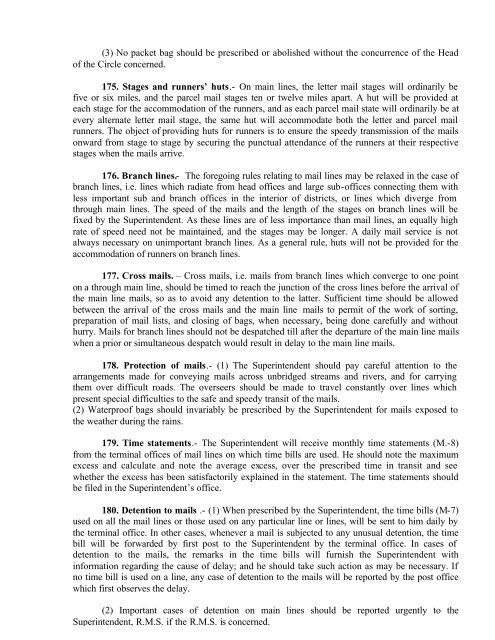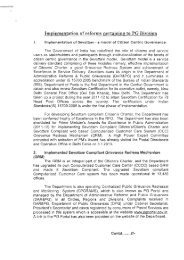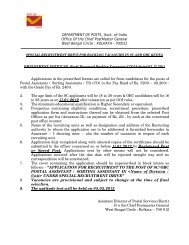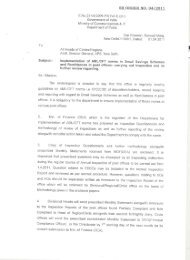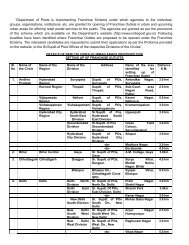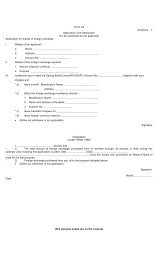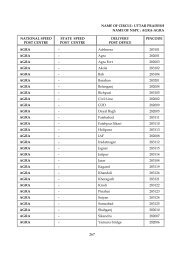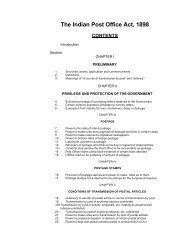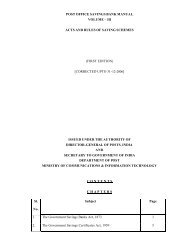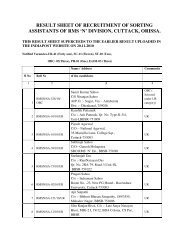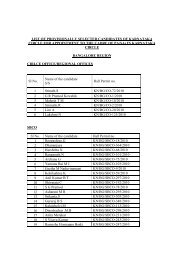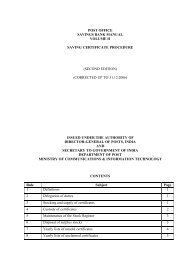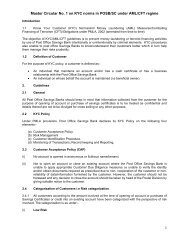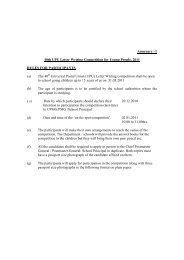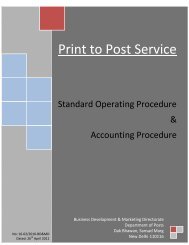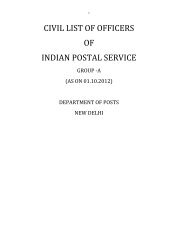Postal Manual Vol. VIII - India Post
Postal Manual Vol. VIII - India Post
Postal Manual Vol. VIII - India Post
You also want an ePaper? Increase the reach of your titles
YUMPU automatically turns print PDFs into web optimized ePapers that Google loves.
(3) No packet bag should be prescribed or abolished without the concurrence of the Head<br />
of the Circle concerned.<br />
175. Stages and runners’ huts.- On main lines, the letter mail stages will ordinarily be<br />
five or six miles, and the parcel mail stages ten or twelve miles apart. A hut will be provided at<br />
each stage for the accommodation of the runners, and as each parcel mail state will ordinarily be at<br />
every alternate letter mail stage, the same hut will accommodate both the letter and parcel mail<br />
runners. The object of providing huts for runners is to ensure the speedy transmission of the mails<br />
onward from stage to stage by securing the punctual attendance of the runners at their respective<br />
stages when the mails arrive.<br />
176. Branch lines.- The foregoing rules relating to mail lines may be relaxed in the case of<br />
branch lines, i.e. lines which radiate from head offices and large sub-offices connecting them with<br />
less important sub and branch offices in the interior of districts, or lines which diverge from<br />
through main lines. The speed of the mails and the length of the stages on branch lines will be<br />
fixed by the Superintendent. As these lines are of less importance than mail lines, an equally high<br />
rate of speed need not be maintained, and the stages may be longer. A daily mail service is not<br />
always necessary on unimportant branch lines. As a general rule, huts will not be provided for the<br />
accommodation of runners on branch lines.<br />
177. Cross mails. – Cross mails, i.e. mails from branch lines which converge to one point<br />
on a through main line, should be timed to reach the junction of the cross lines before the arrival of<br />
the main line mails, so as to avoid any detention to the latter. Sufficient time should be allowed<br />
between the arrival of the cross mails and the main line mails to permit of the work of sorting,<br />
preparation of mail lists, and closing of bags, when necessary, being done carefully and without<br />
hurry. Mails for branch lines should not be despatched till after the departure of the main line mails<br />
when a prior or simultaneous despatch would result in delay to the main line mails.<br />
178. Protection of mails.- (1) The Superintendent should pay careful attention to the<br />
arrangements made for conveying mails across unbridged streams and rivers, and for carrying<br />
them over difficult roads. The overseers should be made to travel constantly over lines which<br />
present special difficulties to the safe and speedy transit of the mails.<br />
(2) Waterproof bags should invariably be prescribed by the Superintendent for mails exposed to<br />
the weather during the rains.<br />
179. Time statements.- The Superintendent will receive monthly time statements (M.-8)<br />
from the terminal offices of mail lines on which time bills are used. He should note the maximum<br />
excess and calculate and note the average excess, over the prescribed time in transit and see<br />
whether the excess has been satisfactorily explained in the statement. The time statements should<br />
be filed in the Superintendent’s office.<br />
180. Detention to mails .- (1) When prescribed by the Superintendent, the time bills (M-7)<br />
used on all the mail lines or those used on any particular line or lines, will be sent to him daily by<br />
the terminal office. In other cases, whenever a mail is subjected to any unusual detention, the time<br />
bill will be forwarded by first post to the Superintendent by the terminal office. In cases of<br />
detention to the mails, the remarks in the time bills will furnish the Superintendent with<br />
information regarding the cause of delay; and he should take such action as may be necessary. If<br />
no time bill is used on a line, any case of detention to the mails will be reported by the post office<br />
which first observes the delay.<br />
(2) Important cases of detention on main lines should be reported urgently to the<br />
Superintendent, R.M.S. if the R.M.S. is concerned.


